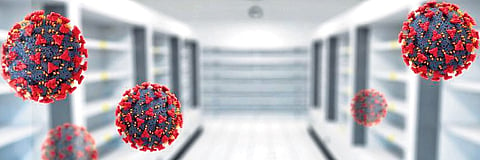

CHENNAI: The nation is abuzz with questions: Is it another COVID-19 variant, or something even more concerning? The Human Metapneumovirus (HMPV), which has been in the spotlight in recent days, is causing unease despite only a handful of cases being reported in India. As anxiety grows, it’s essential to separate fact from fiction and understand the reality of this virus.
To shed light on the situation, CE spoke to experts who offered valuable insights and practical advice.
What is HMPV and should we be worried?
Dr Jagadeesh Kumar V, senior physician, diabetologist, and internal medicine specialist, urges people not to panic. He explains, “So far, there’s no need for alarm. HMPV is not new to the medical community — it has been around for years. It’s only gaining attention now because it’s new to the media and the general public. This virus is similar to other viral fevers and typically causes upper respiratory symptoms like a runny nose, headache, fever, and a dry cough. Symptoms usually last five-seven days or up to 10 days in some cases. Rarely, people with allergies may experience symptoms for up to two weeks.”
He advises against overreacting, stating, “Don’t waste money on unnecessary tests if you’re clinically stable. Viral fevers come and go, and this is no exception. Simple measures like wearing a mask and practising hygiene are sufficient. It’s too early to determine whether there’s a change in the variant, but for now, nothing appears threatening.”
Dr Kumar also points out that HMPV is similar to respiratory viruses like Respiratory Syncytial Virus (RSV) and Metapneumovirus, which have been known for years. “There’s no specific treatment required. Panic only leads to unnecessary expenses,” he adds.
HMPV vs COVID-19: Dr Satish C Reddy, consultant pulmunologist, explains that HMPV and SARS-CoV-2 have significant differences:
Severity: HMPV generally causes milder symptoms and is far less contagious.
Demographics: HMPV primarily affects vulnerable groups such as children and the elderly, unlike COVID-19, which impacted people across all age groups.The message from experts is clear — stay informed, practice basic hygiene, and avoid unnecessary panic. For now, HMPV appears to be manageable, with no immediate need for alarm.
PRECAUTIONS
Cover your mouth and nose with a handkerchief or tissue when coughing or sneezing
Wash your hands regularly
Avoid crowded places and stay home if you have fever, cough, or sneezing
Drink plenty of water and eat nutritious food
Refrain from self-medication for persistent symptoms — consult a healthcare provider for accurate diagnosis and treatment